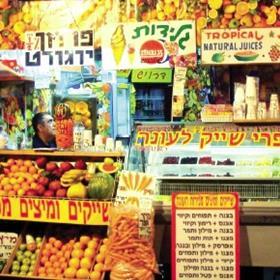
While not living-up to expectations in terms of the number and diversity of overseas visitors, the two-day Agro-Mashov exhibition at the Tel Aviv Showgrounds was very well attended, particularly from all sectors of Israeli agriculture. In addition, there was a strong Palestinian presence, including the Palestinian Authority’s own pavilion and some individual booths belonging to Palestinian machinery manufacturers and producers of herbs and olive oil.
Pre-show marketing had suggested there would be large contingents from BRIC countries. Although this did not completely materialise, each of the four up-and-coming global powers were represented in some way, by the Embassy of Brazil in Israel, by a very good presentation on eastern European fresh produce markets by Natalia Bammatova of EuroFresh Distribution, by two stands belonging to Indian companies and by a pesticide raw material company from Shanghai. A strong South American presence, meanwhile, was noted and a number of Latin American embassies in Israel had their own stands. From Africa, the main country represented was Nigeria. But disappointingly, as hopes had been high, few Russian or Turkish visitors were seen. 
The show’s primary focus was on the environment, in particular “green energy”. In addition to the main hall of exhibitors, there was a secondary, smaller hall where exhibitors showed how energy generated from wind and the sun could be used in agriculture, as well as innovative ideas for recycling. Green issues also received particular emphasis at the Ohio (US) – Negev Foundation Symposium, which referred to energy production as a new crop.
Accompanying Agro-Mashov was a programme of symposia on challenges in agricultural production. On the opening day, entitled ‘How to cope with the present and future world food crisis’, the first speaker began at 8.15am and was followed by another 11 speakers – each with very limited time which, in my opinion, prevented them from doing justice to their topic – through until 11am. The afternoon was then devoted to ‘Changes and trends in the marketing of fresh produce’, with one session focusing on the Israeli market and a second looking at Europe, Russia and China.
The session on marketing of fresh produce in the local market was lively, relevant and interesting, with a good level of audience participation. It opened with Meir Yifrah, head of the Israeli Vegetable Growers’ Association, in which he presented up-to-date growing and marketing data and spoke about the activities of some 243 vegetable marketers (as opposed to many more growers) in Israel – 87 for export, 22 for the processing industry and 134 for the local market. “Today, there are 55,000ha under vegetable cultivation, of these 7,100 protected. The resulting produce is split into 1,097,000 tonnes (54 per cent) for local consumption, 565,000 tonnes (28 per cent) for export and 371,000 tonnes (18 per cent) for industry,” said Mr Yifrah.
A panel discussion followed, involving representatives of the two main retail chains – Rani Sela of Katif, suppliers to market leader Shufersal (Supersal) in its varied store formats and Eli Azoulay, head of fruit and vegetables at Yachdav, suppliers to Blue Square and Mega stores – alongside Shaul Geva of the Israeli Wholesale Distributors Association, Ilan Eshel, CEO of the Israel Fruit Growers Association, and Shir Halperin, representing the country’s farmers’ markets.
A heated discussion about the position of growers as a link in the production and marketing chain ensued. Mr Sela and Mr Azoulay argued that, to the farmers’ benefit, it was essential to sign long-term supply contracts with customers to ensure consistent high quality supply throughout the season. Mr Geva, meanwhile, argued that such retail contracts were based on lower prices for fresh produce as a way of attracting customers into the stores, where they would presumably also purchase items with larger profit margins. The debate reached a positive conclusion,in that all of the speakers agreed to continue the discussion at a later datein an effort to coordinate future efforts and promotions.



